Since about five years, both the Myanmar army or Tatmadaw and the Arakan Army (AA) have fought each other in Paletwa, which becomes a focal point of geostrategic and military importance as both are trying to control the strategic point overseeing the Kaladan River, which flows through Chin and Arakan states used as transport route for goods and public transport.
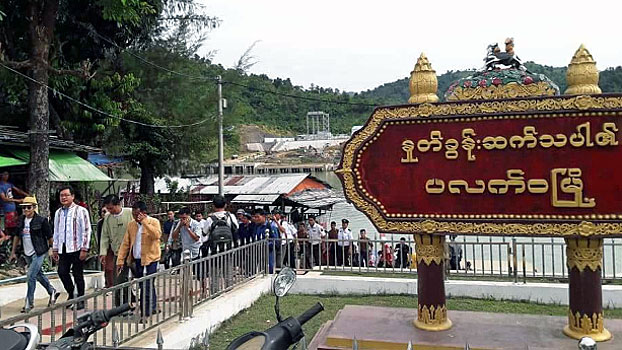
But apart from this there also is another brewing controversy with regards to the AA operation in the area and the Tatmadaw trying to evict and annihilate its troops, affecting the local people, making thousands of Chin and as well the Arakanese internally displaced persons (IDPs).
The Chin National Front (CNF), which have signed the nationwide ceasefire agreement (NCA) with the government in 2015, gave ultimatum to the AA to withdraw from the area reportedly in 2016 as it belongs to the Chin State. But the latter refused to comply, according to the CNF. It also indicated that the Tatmadaw should also stop the fighting, in no concrete terms, The Irrawaddy media reported on 16 July.
Then a discussion topic popped up on who owns Paletwa, among a limited informed group of ethnic nationality watchers and observers. The one who posted it is Khin Maung Saw, a well known Arakan activist and writer based in Berlin.
As it is he argued: “In my humble opinion, the real owner of Paletwa district is the Bama Central Government, not the Chins nor Rakhaings.”
He went on to explain who really calls the shot in ethnic states saying :“Shwe Gas wells, Kyauk Phyu deep seaport, etc., etc., are in the Rakhine State, however, neither Rakhine State Government nor Rakhine people are allowed to manage them. Instead, the Bamar central government sold the products to the foreigners. The central government uses not even 10 percent of the income (from the revenue) for Rakhine State and Rakhine people.”
“Assuming, if there are some natural resources found in the Paletwa District, the Chins and Chin State may not get anything or use the revenue for their own state, but the big brothers, “the Bama Central Government” would come and manage it. Most probably it would sell it to foreigners and the income would go to the central government, perhaps only giving some “pocket money” to the Chins and Chin state government.”
He argued and speculates that the suppose to be owner won’t be able to do anything against the central government exploitation.
To his argument, a former CNF leader Thang Za Dal, living in exile in Hamburg, Germany pointed out that the reality is the ethnic nationalities are in no position to assert sovereignty or legitimacy claims in practical sense.
He wrote: “I fully agree with this assessment (that ethnic don’t really own their states). Not only Paletwa, but the real owners of all the ethnic peoples’ countries are the ethnic Burmans – to be precise – the elite Burmans.”
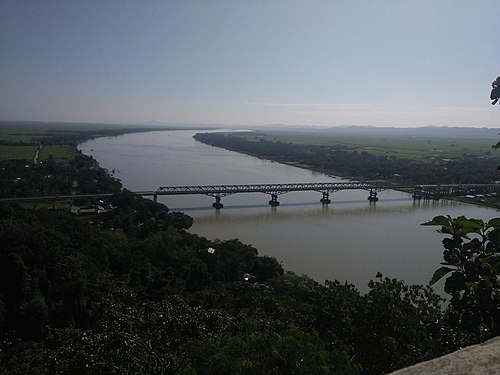
He further explained: “Every well-informed person everywhere in this world knows that there are two factors: de facto and de jure. Although I’m not a lawyer, so far as know as a layman, what has been happening in Burma with regards to all the non-Bamar races is: in reality, they don’t exist either de facto or de jure. So long as your ethnic group doesn’t exist in form of de facto and de jure, you’re nothing. You can disappear from this earth at any time. To exist de facto and de jure means you must have the full right to create your own destiny!”
To the issue, this writer pointed out the necessary tool that could change the situation.
The argument goes like this:
“What Thang Za Dal said is the real situation of the whole country, except the Wa controlled territories, Mongla and pockets of liberated and semi-liberated areas ruled by the non-Bamar ethnic nationality resistance armies.
De facto and de jure need a bit of explanation to be clear. The former is the real existing situation on the ground and the latter means legally and officially recognized by at least one country or some members of international community.
What Thang Za Dal indicated is that most of the ethnic resistance forces and its people are not in the capacity to fulfill either the de facto or de jure situation.
This situation if it is to be changed needs what we call acceptance of “belligerency” situation. It means the ability to aggressively defend and impose one’s rule, which is also accepted by the concerned country or nation-state. So, in order to be de facto, belligerency power is needed. And this is only achievable with military strength like the UWSA or Wa has shown.
“ Belligerency is the final category of a challenge to the established government, recognized by customary international law, and implies a more serious conflict than any rebellion or insurgency. It is also a concept more clearly defined in international law than any of the other categories of conflict. The recognition of belligerency formalizes the rights and obligations of all parties in a war. It is “the acknowledgment of a legal fact that there exists a state of hostilities between the two groups vying for power or authority; it is … the recognition of the existence of war,” according to Anirudh Agrawal, in his “ Laws Governing Insurgency and Belligerency in International Law,” published by Hidayatullah National Law University and posted on Posted 19th February 2017 .
Arguing about who owns Paletwa now and trying to impose ban on AA movement by the CNF could fall into the trap of divide-and-rule scheme of the real occupier. In fact, as far as I could gather, AA Chief Tun Myat Naing didn’t claim ownership of Paletwa and only indicated that his troops are there for geostrategic reasons to fight the oppressors.
In sum, all the ethnic nationality resistance forces need to build up their military capability and fight in unison and not against each other. And at least try to achieve the status of de facto through belligerency measures, so that they will have more bargaining power in the political settlement negotiations and not as underdog.“
Finally, the ethnic armed organizations (EAOs) fighting or quarreling over a territory, which they really don’t have a slightest say is mind-boggling, as this will only empower the oppressors’ “divide-and-rule” scheme that will drive a wedge among the ethnc nationalities.
For now, it is advisable not to touch the issue except to tell the AA that the last ethnic state demarcation should at least be honored and hinting to resolve it along this line, when situation permits.





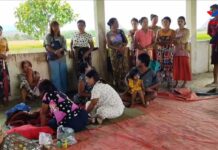
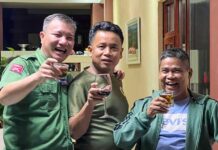


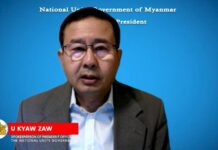






Leave a Comments